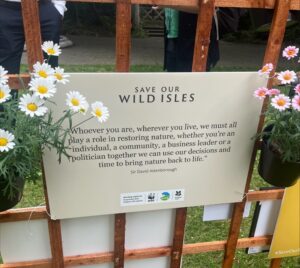Last week our head of Research & Development; Helen Simmen, was lucky enough to attend a reception evening for the Save Our Wild Isles campaign, organised about by the charities WWF, RSPB and The National Trust.
Held in The College Garden in the middle of Westminster, the event aimed to bring together business leaders, members of Parliament and nature advocates to highlight the importance of taking immediate action to protect and restore nature in the UK. Centred around the David Attenborough BBC TV series Wild Isles, which aired earlier this year, the campaign has been put together by the three charities to inspire people to value UK nature and take action to protect it through a sense of collective agency. A major part of this has been the People’s Assembly for Nature and the People’s Plan for Nature which came about as a result.
At the reception were representatives of the three charities who presented information on the People’s Plan for Nature, including their hopes and ambitions for political, business and community driven action that will come about as a result. Helen spoke to a representative from WWF who explained how the project has been funded and driven by the charities but the idea is that now it is in motion they will take a step back, facilitating by making connections between stakeholders.
The People’s Plan for Nature illustrates just how much the public want change, and what’s so striking about it is the clear and simple plan that is laid out for achieving nature recovery. Along with the democratic way it has been put together, this makes it a campaign that’s easy to get behind and full of hope for the future. The People’s Assembly for Nature was made up of 103 representative members of the public from all walks of life who collectively deliberated, assisted by facilitators and an advisory group, on the problems faced by nature currently and came up with 26 clear and robust Calls to Action which make up the plan. Written in the words of the assembly members, these are the most urgent and influential actions to be taken now to deliver change. These have been grouped according to broad themes:
- Vision and Leadership
- Regulation and Implementation
- Nature-friendly Farming
- Food Production and Consumption
- Marine Protections for our Coastal Waters
- Waterway and Catchment Management
- Local Access to Nature
- Using Evidence Effectively

The plan recognises that although all of us bear a responsibility for taking action, most of the Calls to Action are directed towards government as the actor that has the most power to make legislative and regulatory change. Hence the involvement of the MPs in last night’s reception.
All who attended were treated to a talk by a representative of each political party: the Environment Secretary, Rt. Hon. Therese Coffey MP; the leader of Liberal Democrats, Sir Ed Davey MP; and the Shadow Environment Secretary, Jim McMahon MP. They were all very keen to portray how much they and their political party care about nature, and how they are willing to put nature at the fore of all decision making, but only time will tell whether these promises come to fruition. With a general election on the horizon, it is clear that all political parties need to take the public’s demand for better consideration of nature recovery very seriously and the People’s Plan for Nature and the Save Our Wild Isles campaign provides an excellent framework for doing so. Let’s hope they take the messages of the evening onboard.

They also heard from a panel of stakeholders led by BBC Springwatch presenter and zoologist Megan McCubbin, including Martin Lines from Nature Friendly Farming Network, Dr Maria Carvalho, Head of Climate Economics and Data at NatWest, and a member of the People’s Assembly for Nature. They had a really insightful and inspiring chat about what their vision for the future of nature in the UK looks like and what steps are needed to get there.

As a business and as individuals we at Wildflower Turf are already committed to putting nature at the forefront of what we do – promoting biodiversity restoration is a core aspect of our business. We relish the opportunity to create biodiverse spaces for nature to thrive and for people to connect with the natural environment. The People’s Plan for Nature gives us the opportunity to check we are on the right track, continue to campaign for change in key areas and identify any areas where we can work harder for nature and facilitate others to do so too. Political action in the form of regulatory and legislative change is key and we will be keeping a close eye on how this develops over the coming months and years.
